

The fishing industry is a cornerstone of global food security, economic sustenance, and cultural identity for millions of people around the world. Encompassing a vast range of activities—from small-scale artisanal fishing to industrial trawling—it plays a complex role in balancing ecological stewardship, social equity, and international governance. As the world grapples with climate change, rising inequality, and the need for sustainable development, the fishing industry sits at a critical intersection of democracy, social justice, environmental protection, and human survival.
For millions, especially in developing countries, fishing is not just a job—it is a way of life. Small-scale fishers often work in harsh, underregulated environments, facing challenges such as unfair market access, lack of social protection, gender discrimination, and encroachment by industrial fleets.
Social justice in the fishing industry involves ensuring equitable distribution of resources, fair labor conditions, and access to basic services like education, healthcare, and infrastructure in coastal communities. Empowering marginalized groups, including women—who play key roles in fish processing and marketing—is essential to creating resilient fishing communities.
Fish is a critical source of protein and micronutrients for over 3 billion people worldwide. The fishing industry thus plays an essential role in addressing hunger and malnutrition, especially in low-income regions. However, the global seafood supply chain is increasingly vulnerable to disruptions from climate change, geopolitical tensions, and market volatility.
Ensuring a stable and equitable supply of fish involves supporting local production systems, reducing food waste, and enhancing the resilience of supply chains. Strengthening links between small-scale producers and consumers through local markets can also reduce reliance on exploitative international trade practices.
The sustainability of the fishing industry is deeply entwined with marine conservation. Overfishing, habitat destruction (e.g., coral reefs, mangroves), and bycatch threaten biodiversity and long-term fish stocks. Climate change further exacerbates these risks by altering ocean temperatures, currents, and ecosystems, pushing many species beyond their traditional ranges.
Responsible fisheries management practices—such as marine protected areas, catch limits, gear restrictions, and ecosystem-based management—are crucial for preserving the ecological balance. Ensuring that these policies are not only science-based but also socially equitable is key to long-term success.
One of the most pressing challenges to sustainable fisheries is IUU fishing, which undermines efforts to manage fish stocks and protect marine biodiversity. Estimated to account for up to 1 in 5 wild-caught fish globally, IUU fishing is often linked to organized crime, human trafficking, and environmental degradation.
Combating IUU fishing requires stronger international cooperation, real-time surveillance technologies, and effective port state controls. It also demands political will and transparency to hold perpetrators accountable, including corporations and nations that turn a blind eye to illegal practices in international waters.
Democracy plays a vital role in how fisheries are managed and governed. Inclusive, transparent decision-making ensures that the voices of small-scale fishers and coastal communities are heard in policy dialogues, rather than being drowned out by corporate and geopolitical interests. Participatory governance enables stakeholders—from indigenous groups to marine scientists—to collaborate on regulations that reflect both ecological realities and community needs.
At an international level, multilateral agreements like the United Nations Convention on the Law of the Sea (UNCLOS) and the FAO Code of Conduct for Responsible Fisheries aim to establish fair and consistent rules for the exploitation of marine resources. However, enforcement and equitable access remain inconsistent, especially in regions with weak regulatory frameworks.
The fishing industry reflects both the promise and peril of human interaction with the natural world. It feeds billions, supports livelihoods, and sustains ancient cultures, yet it also faces severe challenges from environmental degradation, inequality, and lawlessness. Addressing these multifaceted issues requires a global commitment to democratic governance, social justice, ecological responsibility, and fair economic opportunity. Only by integrating these values can the fishing industry remain a vital part of our shared future.
The fishing industry includes any industry or activity that takes, cultures, processes, preserves, stores, transports, markets or sells fish or fish products. It is defined by the Food and Agriculture Organization as including recreational, subsistence and commercial fishing, as well as the related harvesting, processing, and marketing sectors. The commercial activity is aimed at the delivery of fish and other seafood products for human consumption or as input factors in other industrial processes. The livelihood of over 500 million people in developing countries depends directly or indirectly on fisheries and aquaculture.